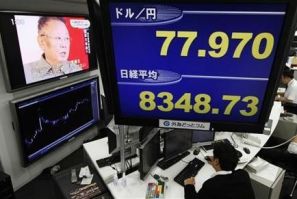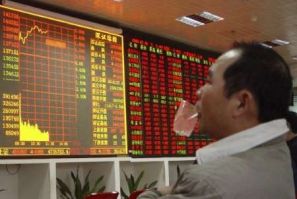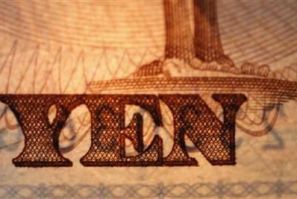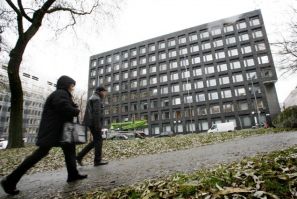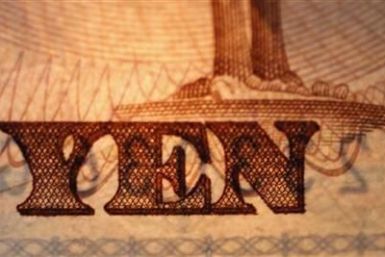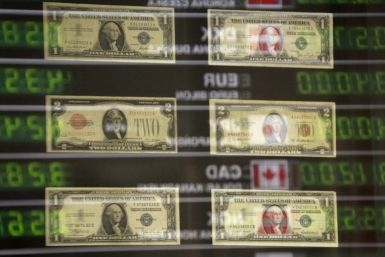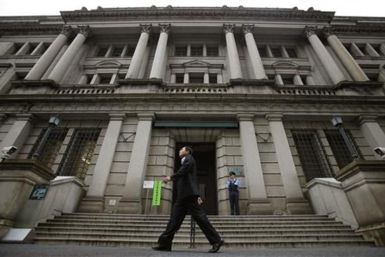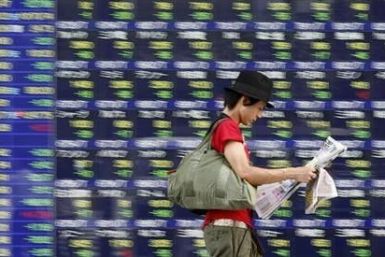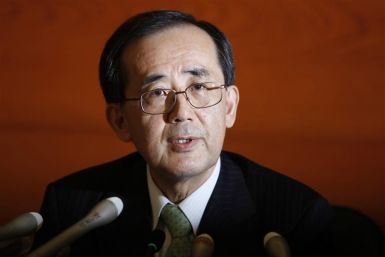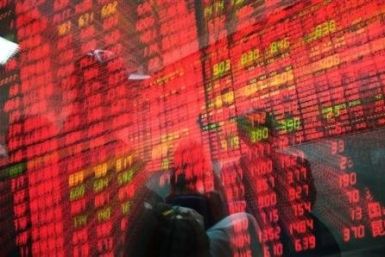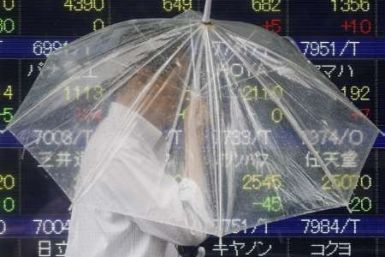Japanese industrial output rose in April at a slower pace than expected, in a discouraging sign that China's slowing economy and Europe's sovereign debt crisis will weigh on Japan's recovery.
Japan?s unemployment rate rose in April compared to previous month increasing concerns of the country?s faltering economic growth momentum.
Japan reported Wednesday a rise in trade deficit in April compared to a year earlier as the nuclear energy crisis has resulted in the increase of oil and gas imports.
Fitch cut Japan's sovereign credit status on Tuesday to the lowest level among global ratings agencies as a political stalemate dims the chance that the country can curb its snowballing debt.
Japan's Nikkei share average rose in early trading Tuesday, continuing Monday's technical correction as investors picked up bargains after last week's flurry of aggressive selling, triggered by concern over a deepening euro crisis.
China can now bypass Wall Street when buying U.S. government debt and go straight to the U.S. Treasury, in what is the Treasury's first-ever direct relationship with a foreign government, according to documents viewed by Reuters.
A day after the largest bank in Japan agreed to comply with a U.S. District Court order barring it from doing business with Iran, bankers and government officials in Tokyo are reportedly trying to find a way to circumvent the commercial embargo.
Japan?s economy grew in the first three months of the year from the preceding quarter, boosted by reconstruction activities in regions hit by last year?s tsunami.
Greece continued to weigh heavily on confidence Wednesday as bank customers there began sending cash out of the country or hiding it under their beds -- this despite hints from German Chancellor Angela Merkel that a stimulus would be forthcoming if the country stuck to its austerity commitments.
Asian markets fell at week's end as Greece's inability to form a government, uninspiring Chinese industrial output growth and JPMorgan's trading losses affected investor sentiment.
The Bank of Japan will expand its Asset Purchase Program by an additional 5 trillion yen ($62 billion) to increase the purchase of Japanese government bonds, exchange-traded funds and Japan real estate investment trusts, the bank announced in a statement Friday.
Asian stock markets ended lower Friday as renewed concerns about the debt-laden Eurozone offset better-than-expected US pending home sales data and corporate earnings.
Asian stock markets declined Friday as sentiment was subdued after Standard & Poor's downgraded Spain's rating.
The Bank of Japan said Friday that it is further easing the monetary policy so that the economy could recover from deflation and grow more strongly.
Gold struggled to make headway Friday as the euro came under pressure after Standard & Poor's downgraded Spain's credit rating, while investors waited for a monetary policy decision by the Bank of Japan later in the day for further trading cues.
Federal Reserve Chairman Ben Bernanke rattled financial markets Wednesday afternoon, as the top U.S. central banker hemmed and hawed his way through a tough round of questioning from a cadre of economic reporters.
It is highly expected that the Bank of Japan will resort to additional monetary easing at its next meeting on April 27 so that the economy could recover from deflation and grow more strongly.
Loan demand from firms and households jumped in the first quarter, adding to the evidence that the Japanese economy is on the path of recovery, according to Senior Loan Officer Survey.
Asian shares slipped Friday as disappointing U.S. economic data stirred doubts about the strength of recovery, while the yen weakened after the Bank of Japan flagged the prospect of further monetary easing to support the struggling economy.
Japan reported Thursday a record trade deficit for fiscal year 2011 as exports tumbled on account of falling global demand and a nuclear energy crisis that resulted in the rise of oil and gas imports.
Bank of Japan Governor Masaaki Shirakawa said on Wednesday the central bank is fully committed to continuing powerful monetary easing through various measures, such as keeping interest rates practically at zero and purchasing financial assets until 1 percent inflation is in sight.
Japan's core machinery orders rose in February against all expectations, indicating that the country’s economy is in the path of recovery in spite of deflationary pressures, a strengthening currency and decreasing foreign demand.




